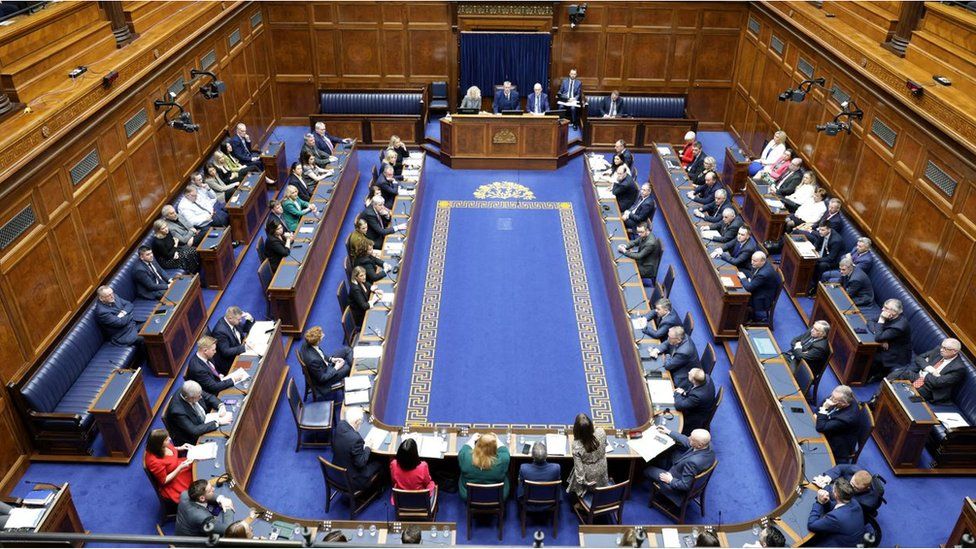ARTICLE AD BOX
 Image source, Liam McBurney/PA Wire
Image source, Liam McBurney/PA Wire
The Stormont Brake allows 30 or more assembly members from two or more parties to petition the UK government to block an update to EU law from applying in NI
By Jayne McCormack
BBC News NI political correspondent
The Democratic Unionist Party (DUP) will try later to veto a new EU law from applying in Northern Ireland.
It will involve using one of the democratic consent processes in the Windsor Framework.
The framework is the special Brexit deal which applies to Northern Ireland and means it continues to follow some EU laws relating to goods.
It provides ways for Stormont to show if it consents to new or amended EU laws applying in Northern Ireland.
The better-known of these is the Stormont Brake, which relates to updated or amended laws.
It allows 30 or more assembly members from two or more parties to petition the UK government to block an update to EU law from applying in Northern Ireland.
Applicability motions are separate and concern the introduction of completely new EU laws to Northern Ireland.
Under this arrangement, the UK will not agree to new EU laws being applied in Northern Ireland unless the assembly passes an applicability motion.
What's the purpose of this DUP motion?
It concerns a new law passed by the EU in November on the protection of geographical indications (GI) for craft and industrial products.
Image source, Liam McBurney/PA Media
Image caption,Sir Jeffrey says the party will vote "decisively" against the motion on a new EU law due to come in
That means legally defining and protecting certain products which are tied to a geographical area.
The party's leader, Sir Jeffrey Donaldson, said if passed it would "substantially expand EU intellectual property law" in Northern Ireland.
He said the DUP motion would mark "a watershed moment" on allowing the Northern Ireland Assembly a say on EU rules.
The legislative process means the DUP motion has to be brought "in the affirmative", meaning it proposes that the law should be applied in Northern Ireland.
But Sir Jeffrey added there should be "no doubt" about the party's motivation.
"We will vote decisively against the motion and against the imposition of this EU regulation," Sir Jeffrey said.
"A decision by the assembly to withhold consent for this new EU rule will practically demonstrate that we have removed the democratic deficit within our devolved context."
In order to pass the motion requires consent from a majority of unionists and nationalists voting, known as cross-community consent.
DUP MLA Jonathan Buckley said that throughout the Brexit process "the democratic deficit and giving the people of Northern Ireland and the people that they elect a direct say in the laws that govern them was paramount to the unionist cause".
He told the BBC's Good Morning Ulster programme that "today is a day for the Northern Ireland Assembly to have their say".
Without that, what happens?
The introduction of new EU laws under the Windsor Framework is ultimately a matter for the UK government.
If the assembly has not expressed cross-party support for the law, via an applicability motion, the government will normally veto it.
The veto will not be applied if the government assesses that the new law would not create a new regulatory border between Great Britain and Northern Ireland, or if exceptional circumstances apply.
If the government vetoes the law the EU could ultimately take "appropriate remedial measures".
What has the government said about this new law?
There are already geographical indications (GIs) for food and drink - for example, only sparkling wines from a certain area of France can be called Champagne.
Image source, Getty Images
Image caption,Italian Murano Glass is an example of a product which falls under the geographical indications regulations
The new law would extend this to cover manufactured goods, such as Italian Murano glass.
The UK government analysis of the law suggests that, in theory, this could mean some products which are legally marketed in Great Britain could not be moved to Northern Ireland to be sold in the same way.
For example, a Great Britain product could be labelled as "Murano glass" and placed on the market in Great Britain in line with Great Britain standards.
But if it did not also meet the EU GI definition, then it could not be moved from Great Britain and placed on the Northern Ireland market - unless it were to be relabelled, so as not to indicate itself to be "Murano glass".
However, the government suggests this scenario is unlikely and that the effect of the law would be "limited".
"Given that the UK's collective and certification marks offer broadly similar protection to that of a GI scheme, we expect there would be few products marketable in GB but not NI," it said.
In contrast to the UK government, Sir Jeffrey said he believed the law could have serious implications for trade between Great Britain and Northern Ireland, and could mean new checks at Northern Ireland ports.
"That is not only harmful to our economy but a threat to the United Kingdom internal market as a whole," he added.
How will other Stormont parties vote?
The Ulster Unionist Party has confirmed that it will also vote against the motion.
But Social Democratic and Labour Party leader of the opposition Matthew O'Toole said his party would vote in favour and accused the DUP of being in a rush to "prove their anti-EU machismo".
"The DUP's stunt in blocking Northern Ireland participation in new protections for craft manufacturing could have real-world consequences for our amazing craft producers," he said.
Mr O'Toole said if the motion was blocked, his party would seek to urge the UK-EU joint committee to allow the law to apply to Northern Ireland.
The joint committee is the formal body that oversees the working of the Windsor Framework.

 10 months ago
121
10 months ago
121








 English (US) ·
English (US) ·